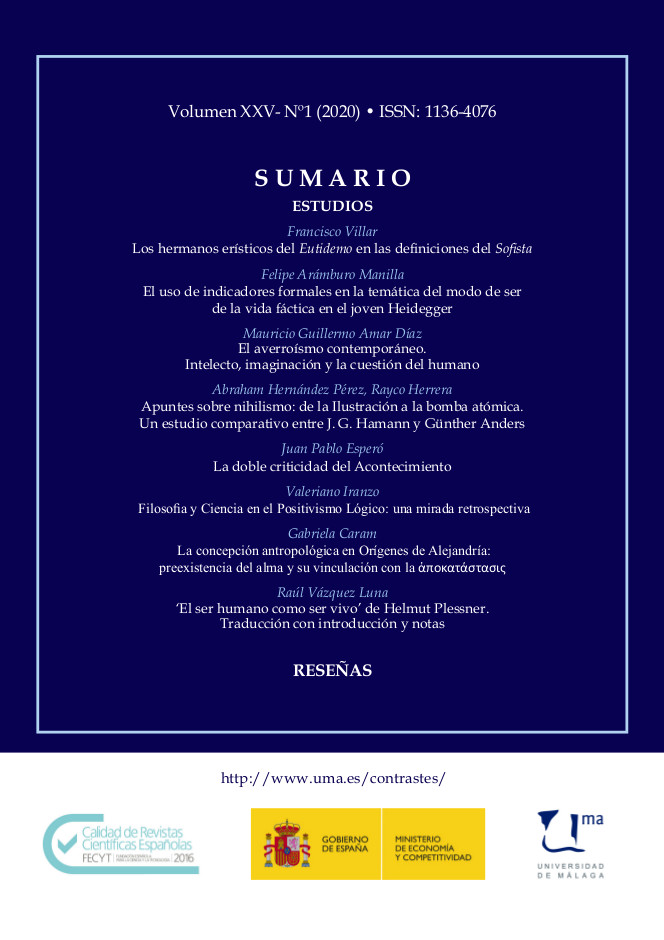Los hermanos erísticos del Eutidemo en las definiciones del Sofista
DOI:
https://doi.org/10.24310/Contrastescontrastes.v25i1.6469Keywords:
Platón, sofista, erística, dialéctica, refutaciónAbstract
En este trabajo defenderé que los erísticos del Eutidemo se dedican a la sofística tal como esta es definida en el Sofista. Propondré que en tanto la quinta y la séptima definición se sirven del concepto de ???????????, ambas son capaces de capturar el componente dialéctico y refutativo de la práctica erística. Preferiré indentificarlos con la séptima no sólo porque constituye la definición final del sofista, sino también porque esta incluye entre sus determinaciones el empleo engañoso de tal forma de argumentación, rasgo que se ajusta más a la erística que el cobro de dinero, elemento principal de la quinta.
Downloads
Metrics
Publication Facts
Reviewer profiles N/A
Author statements
Indexed in
-
—
- Academic society
- N/A
- Publisher
- Universidad de Málaga
References
BURNET, J. (1995): Platonis Opera I. Oxford: Oxford University Press.
CANTO, M. (1989): Platon. Euthydème. Paris: Flammarion.
CHANCE, T. (1992): Plato’s Euthydemus: Analysis of What Is and Is Not Philosophy. Berkeley-Los Angeles, University of California Press.
CHANTRAINE, P. (1968): Dictionnaire Étymologique de la langue grecque. Histoire des mots. Paris: Klincksieck.
CLASSEN, C. J. (1979): “Aristotle’s picture of the sophists”. En G. B. Kerferd (Ed.). The Sophists and Their Legacy. Wiesbaden: Franz Steiner Verlag Gmbh, pp. 7-24.
CORDERO, N. (1988): Platón. Sofista. Madrid: Gredos.
CORNFORD, F. M. (1935): Plato’s Theory of Knowledge. London: Routledge y Kegan Paul.
CROMBIE, I. M. (1963): An Examination of Plato's Doctrines. Vol. II. Routledge y Kegan Paul: Londres.
DENYER, N. (1991): Language, Thought and Falsehook in Ancient Greek Philosophy. Londres-New York: Routledge.
DORION, L. A. (1995): Aristote. Les réfutations sophistiques. Paris: Vrin.
DORION, L. A. (2000): “Euthydème et Dionysodore sont-ils des Mégariques?”. En T. Robinson y L. Brisson (Eds.). Plato. Euthydemus, Lysis, Charmides. Proceedings of the V Symposium Platonicum. Sankt Augustin: Academia Verlag, pp. 35-50.
GARDELLA, M. (2013): “Conflictos socráticos en el Eutidemo: la crítica platónica a la dialéctica megárica”. Argos. Revista de la Asociación Argentina de Estudios Clásicos 36, pp. 45-64.
GILL, C. (2000): “Protreptic and Dialectic in Plato's Euthydemus”. En T. Robinson y L. Brisson (Eds.). Plato. Euthydemus, Lysis, Charmides. Proceedings of the V Symposium Platonicum. Sankt Augustin: Academia Verlag, pp. 133-143.
GILL, M. L. (2006): “Models in Plato’s Sophist and Statesman”. Journal of the International Plato Society 6.
GROTE, G. (1850): History of Greece. Volume 8. Cambridge: Cambridge University Press.
GUTHRIE, W. K. C. (1969): A History of Greek Philosophy III. The Fifth-Century Enlightenment. Cambridge, Cambidge Universit Press.
HAWTREY, R. (1981): Commentary on Plato's Euthydemus. Philadelphia: American Philosophical Society.
HITCHCOCK, D. (2000): “The origin of professional eristic”. En T. Robinson y L. Brisson (Eds.). Plato. Euthydemus, Lysis, Charmides. Proceedings of the V Symposium Platonicum. Sankt Augustin: Academia Verlag, pp. 59-67.
KERFERD, G. B. (1976): “The Image of Wise Man in Greece in the period befote Plato”. En Bossier F., De Wachter, F., Ijsewijn J. et al (Eds.). Images of Man in Ancient and Medieval Thought. Leuven: Leuven University Press.
KERFERD, G. B. (1981): The Sophistic Movement. Cambridge: Cambridge University Press.
MARCOS, G. E. (2000), “Las Falacias en torno a la Falsedad. Una lectura de Eutidemo 283e-286b a la Luz de la Solución del Sofista”. En T. Robinson y L. Brisson (Eds.). Plato. Euthydemus, Lysis, Charmides. Proceedings of the V Symposium Platonicum. Sankt Augustin: Academia Verlag, pp. 144-153.
MÁRSICO, C. y H. INVERSO (2012): Platón. Eutidemo. Buenos Aires: Losada.
MÉRIDIER, L. (1931): Platon: Ion, Ménexène, Euthydème. Paris: Les Belles Lettres.
NARCY, M. (1984): Le philosophe et son doublé. Un commentaire de l’ Euthydème de Platon. Paris: Vrin.
NARCY, M. (2013): “Remarks on the First Five Definitions of the Sophist (Soph. 221c-235a)”. En B. Bossi y T. Robinson (Eds.). Plato’s Sophist revisited. Berlin: De Gruyter, pp. 57-70.
NEHAMAS, A. (1989): “Eristic, Antilogic, Sophistic, Dialectic: Plato’s Demarcation of Philosophy from Sophistry”. History of Philosophy Quarterly 7(1), pp. 3-16.
NOTOMI, N. (1999): The Unity of Plato’s Sophist. Cambridge: Cambridge University Press.
OSCANYAN, S. (1972): WOn Six Definitions of the Sophist: Soph. 221c-231e”. The Philosophical Forum 4, pp. 174-254.
RAPPE, S. (2000): “Father of the Dogs? Tracking the Cynics in Plato’s Euthydemus”. Classical Philology 95(3), pp. 282-303.
RICKLESS, S. (2010): “Plato’s definition(s) of sophistry”. Ancient Philosophy 30(2), pp. 289-298.
ROWE, C. (2015): Plato. Theaetetus and Sophist. Cambridge: Cambridge University Press.
SAYRE, K. (2006): Metaphysics and Method in Plato’s Statesman. Nueva York: Cambridge University Press.
SERMAMAGLOU-SOULMADI, G. (2014): Playful Philosophy and Serious Sophistry. Berlin-Boston: De Gruyter.
SOLANA, J. (2013): “Socrates and ‘Noble’ Sophistry (Sophist 226b-231c)”. En B. Bossi y T. Robinson (Eds.). Plato’s Sophist revisited. Berlin: De Gruyter, pp. 71-85.
SPRAGUE, R. (1972): The Older Sophists. Indianapolis: Hackett Publishing Company.
SPRAGUE, R. (2000): “The Euthydemus Revisited”. En T. Robinson y L. Brisson (Eds.). Plato. Euthydemus, Lysis, Charmides. Proceedings of the V Symposium Platonicum. Sankt Augustin: Academia Verlag, pp. 3-19.
VIGO, A. (2001): “Platón, en torno a las condiciones y la función del diálogo cooperativo”. Tópicos 9, pp. 5-41.
Downloads
Published
How to Cite
Issue
Section
License
This journal provides immediate free access to its content under the principle of making research freely available to the public. All content published in Contrastes. Revista Internacional de Filosofía, are subject to the Creative Commons Attribution-NonCommercial-ShareAlike 4.0 license whose full text can be found at <http://creativecommons.org/licenses/by-nc-sa/4.0>
It is the responsibility of the authors to obtain the necessary permissions of the images that are subject to copyright.
Authors whose contributions are accepted for publication in this journal will retain the non-exclusive right to use their contributions for academic, research and educational purposes, including self-archiving or repository in open access repositories of any kind.
The electronic edition of this magazine is edited by the Editorial Service of the University of Malaga (Uma Editorial), being necessary to cite the origin in any partial or total reproduction.










5.png)
